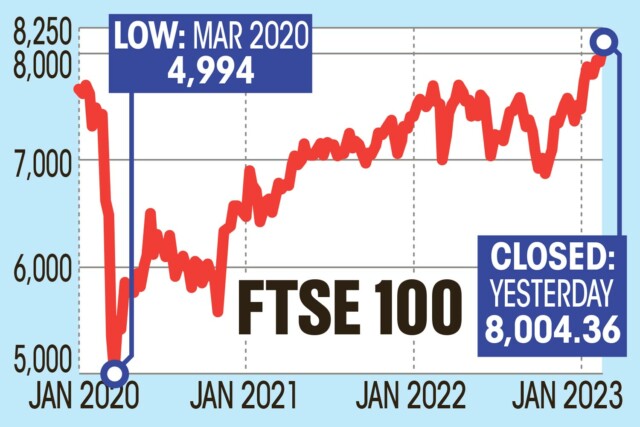THIS week the UK’s top stock market index — the FTSE 100 — crossed the 8,000-point barrier for the first time.
Follow our Q&A explainer below to see how it impacts you.
Follow our Q&A explainer below to see how it impacts you
What is the FTSE 100?
The FTSE 100 is made up of the 100 biggest publicly traded companies on the London Stock Exchange.
It is usually used as a measure of wealth and a guide of how the UK is doing relative to other stock markets.
What does 8,000 points mean?
It shows that share prices have been rising and the index is up more than 6 per cent already this year.
Crossing 8,000 is a psychological win and shows investors have come a long way since it crashed below 5,000 at the start of the pandemic.
Why has it been rising?
The biggest driver has been optimism that the rate of inflation has peaked, and official figures showing the rate of price rises eased in January has helped fuel that this week.
What does it mean for me?
The message the market is sending is things are improving.
The FTSE 100 gains are good news for savers, investors and pension funds.
Should I start buying champagne?
Well, the FTSE 100 isn’t a great indicator of the actual UK economy.
That’s because most of the big “British” companies make three- quarters of their earnings overseas.
Should I start selling?
Although the FTSE 100 has hit record levels, many of the companies are relatively cheap still so the stock market should hold up well.
NATWEST £5BN
PROFITS at Natwest jumped by a third to £5.1billion on the back of higher mortgage and loan rates.
The bank, 45 per cent-owned by the taxpayer, defended handing CEO Alison Rose a bumper £5.25million, including the first bonus for a boss since 2008.
It said it reflected a “strong year for the business”.
SALE BOOSTER
RETAILERS had an unexpected boost last month as shoppers splurged on January promotions.
Sales rose by 0.5 per cent, despite predictions the cost of living crisis could see a 0.3 per cent fall.
Fuel sales rose 1.7 per cent as drivers took advantage of falling petrol prices.








